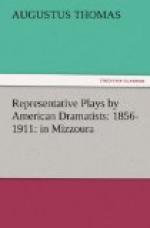Thomas’s interesting prefaces suggest this limitation in him, whether it be a psychic subject he is to handle or an historical period he is to cover. His manner of cogitating a theme has always been in terms of the theatre, and he is willing to curtail any part of his theme for a “point.” His explanation, therefore, of the growth of detail, while lacking in the high seriousness of Poe’s explanation how he conceived “The Raven,” has nevertheless the same mathematical precision about it. In other words, Thomas plays the theatre as Steinitz played chess, with certain recognized openings and certain stated values to the characters. We doubt whether, if the truth were told, many changes ever occur, once a Thomas scenario is planned. His whole game is to capture as many of his audience as he can by strategy, to checkmate them by any legitimate theatrical move, regardless of tenability of subject, and in despite of truth. Hence, when he fitted up “Arizona” in clothes to suit recent Mexican complications, and called his play “Rio Grande,” he found he had lost the early sincerity of “Alabama,” and his raciness was swamped in an apparent sophistication which only added to his artificial method of conceiving a plot.
He has, therefore, played the theatrical game with love for it, with thorough understanding of it—and though political preferment in the Democratic Party has been offered him many times, he has thus far not deserted the theatre. As the years advance, he does not seem to lose any of his dexterity; on the other hand, he does not show inclination to be stirred in his plays by the social problems of the day. When “The Witching Hour” showed a departure into realms of subtle psychology, we thought Thomas, as a playwright, had passed into the realm of wisdom; but his introduction to that play reveals the fact that, once, he was press-agent for a thought-reader. So it was the “showman” aspect of the subject which led him to read up on auto-hypnosis. It was not so much conviction as picturesqueness which prompted him to write, in 1890, the one-act psychic sketch which afterwards became the longer play. His enthusiasm was of considerable duration; it passed from one play to another, and among his “subtle” pieces on the same theme were “The Harvest Moon” and “As a Man Thinks.”




